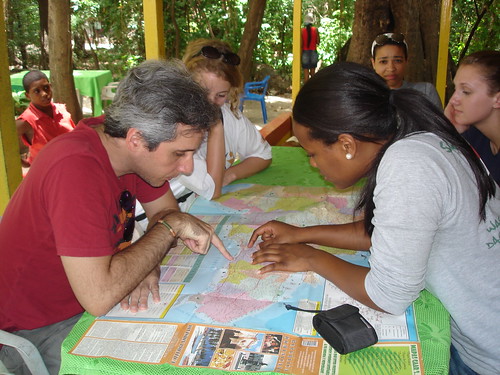 By: Ludonis Maule
By: Ludonis MauleLudonis Maule is a senior at Baruch College majoring in Entrepreneurship Management with a minor in Spanish. She has worked at Baruch College’s Study Abroad Office for the past three years where she advises students on their study abroad options and procedures, she has also coordinated several of the office's Study Abroad Fairs. This spring 2012 semester she is interning at InteRDom in the Marketing department.
Most employers appreciate students who are engaged in other positive activities outside of academics. International academics or work experience is also very appealing to employers. This international experience will be more valuable to a firm which operates worldwide. More than likely, you will have some knowledge about another country’s culture which may be useful for business. This increases your marketability as an employee.
A Global HR News study revealed that nearly three in four (73%) HR executives cited study abroad as an essential element when evaluating the resume of a potential job candidate for a junior-level position. According to Experience Inc., studying abroad is valued by employers because the individual is viewed as being:
- Culturally aware
- Flexible and tolerant
- Sensitive to and accommodating of other cultures
- Independent and Mature
 Based on this information, an individual who studied abroad is already attributed qualities from the international experience listed on his/her resume even before they sell themselves verbally in the interview. This study abroad experience can be listed several places on your resume. It can be placed under educational experience including the school you attended, its location along with any course work completed. If the program has an internship component it can be listed under work experience.
Based on this information, an individual who studied abroad is already attributed qualities from the international experience listed on his/her resume even before they sell themselves verbally in the interview. This study abroad experience can be listed several places on your resume. It can be placed under educational experience including the school you attended, its location along with any course work completed. If the program has an internship component it can be listed under work experience.Once your study abroad experience has been placed on your resume, you should be prepared to speak about it in an interview. Some interviewers will ask about it directly but others may not. However, you should try to incorporate your time abroad, the skills you acquired, the lessons you learned and the cultural sensitivity you developed into the interview in some way. It is important to emphasize that you did not just go overseas to have a good time, but you learned important things that are applicable to your professional life. For example, learning to think outside of the box, consider new and different viewpoints and be more independent and/or work in a team are all important skills you may have developed while abroad which should be emphasized.
As we all know, a great command of a second language is becoming even more vital to the globalized business world. Hence, the opportunity to study and speak the native language of another country should be seized in order to increase your professional marketability. While learning and practicing the language, you are inherently immersing yourself in a country’s culture. This is another reason why studying abroad is important; one has a better chance of experiencing and understanding a culture at its fullest when they are entirely immersed. We tend to be more appreciative and more open minded when we experience other cultures first-hand.
Studying abroad is not only a cultural experience, but it provides you with qualities which, if marketed properly, can be a major attraction for future employers.

No comments:
Post a Comment